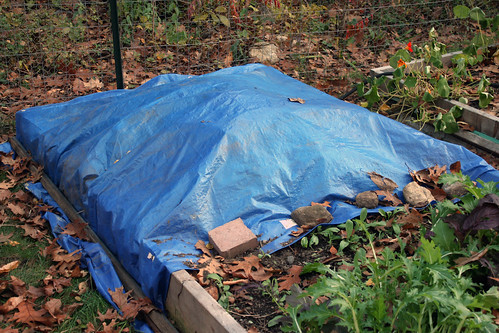In past years, I have only had to deal with one or two infected tomato plants. I bagged them in black plastic, left them in the sun a few days so the heat killed the plants and pathogens, then I threw the bags out with my trash.
This year, however, I had 24 tomato plants and they all were completely infected with late blight. And they were enormous plants. It would have been too much work (and too many bags) to bag all the plant material. I checked a late blight information sheet published by Cornell University.
Immediately remove affected plant tissue. It is best to do this in the middle of a sunny day after the leaves have dried when there will be fewer spores and those dislodged in the process will likely be exposed to UV radiation. But don’t wait days for these conditions. Put affected tissue in garbage bags, dig a hole and bury it, or put it in a pile and cover with a tarp. Heat that develops from sunlight hitting the tarp will quicken death of plant tissue and the pathogen. For the same reason, leave garbage bags in sun for a few days before throwing out.So, I put my tomato plants in a pile and cover them with a tarp in a sunny place. I should have done this a long time ago, but I figure better late then never. Next time, I will know what to do and will tarp infected plant material right away when I take it down.
- copied from Managing Late Blight in Tomato and Potato – An Essential Part of Gardening, by Margaret Tuttle McGrath, Department of Plant Pathology and Plant-Microbe Biology, Cornell University
This procedure should guarantee that the late blight pathogen is killed. The article doesn't say how long to tarp-treat teh plant material so I will leave it covered until spring and then compost it.

1 comment:
Thanks for the helpful hint! I've been battling late for a couple of years and will use the tarp method and see what happens.
Post a Comment